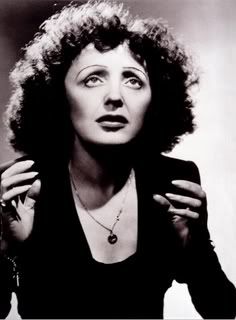.jpg) Name: La Vie En Rose
Name: La Vie En RoseDirector: Olivier Dahan
Starring: Marion Cotillard, Sylvie Testud, Pascal Greggory
Length: 134 mins
Year: 2007
La Vie En Rose is the most recent dramatisation of French singer Edith Piaf’s colourful life. Her early years were spent in the Parisian slums with her alcoholic mother, who struggled to live the artistic life she wanted with a child in tow, so Edith was placed in the care of her grandmother. This was until her father whisked her away to his mother’s brothel for safe-keeping while he went to war. He then returned and removed his daughter from this relatively stable, if somewhat dangerous, setting and they took to the road with the travelling circus. Not your average start in life.
Young Edith's first performance was on the street; her acrobatic father instructed her on the spot to ‘do something’ to entertain the crowd of people gathered around them. Years later, at the age of 20, her vocal talent was discovered and she was given a job as a club singer. Edith quickly learnt to survive amongst the bawdy music scene, joining in with the culture of excess that surrounded her. Noticing she could do better, Raymond Asso took her under his wing for professional vocal training, and the result was a woman who sang with her hands as well as her voice.
The film scooped up around 30 awards and a similar number of nominations; predominantly for Cotillard’s stunning performance as the turbulent Edith, but also for costume design, make-up and directing, all of which are definitely deserved.
However, La Vie En Rose appears to focus more on Edith’s sufferings than her career and talent. It is obviously attempting to ‘wow’ audiences into admiring her ability to reach such dizzying heights of stardom despite her various obstacles, addictions and losses.
 |
| The real Edith |
This is all well and good, but her perceived tenacity is often just rudeness. The word 'diva' must have been invented for Edith, as she treated those around her with little respect, lived a lavish life that led to her own demise, and to top it off, she regretted none of this behaviour. Is that really admirable?
Some have criticised La Vie En Rose for its fragmentary structure: the various events of Edith’s life are presented as flashbacks in what could be seen as an arbitrary order, which has become something of a cliché in the biographical genre. But this structure - clichéd or not - relevantly portrays Edith’s manic mentality. Placing different aged Edith's side-by-side demonstrates her instability - neither the film nor the woman can keep still.
This is the story of a gutsy, talented and turbulent woman who refused to give up. Not a jolly film by any stretch, but an inspiring and powerful one that ends on a rather stirring note.
No comments:
Post a Comment